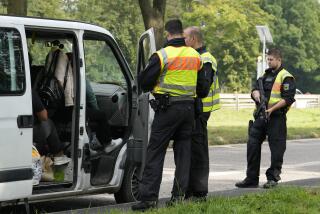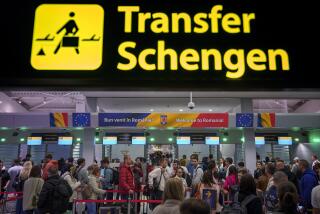THE WALL CRUMBLES : Talk of One Germany Is Premature, Soviets Say : East Bloc: Moscow praises East Germany’s decision to open its borders. But Bonn is warned not to rock the boat.
- Share via
MOSCOW — The Soviet Union, while praising East Germany’s decision to permit its citizens to travel freely to West Germany, reminded Bonn on Friday that there is still an international border between the two countries and that it cannot be changed without the agreement of the rest of Europe.
Gennady I. Gerasimov, the chief spokesman for the Soviet Foreign Ministry, warned the West German government not to press ahead with proposals for German reunification, for other political changes in Central Europe or for any alteration of postwar borders, because all could undermine the continent’s stability.
“Bonn should take into account the fact that a policy aimed at changing borders would not suit any government in Europe and would only sow distrust,” Gerasimov told reporters at a Foreign Ministry briefing.
Border Remains
The East German decision to open the border introduced new regulations for crossing, Gerasimov said, but the border remains--as does the Soviet Union’s commitment to observe it and to support East Germany as a strategic ally.
“Politically, it is not the time now to talk about German reunification,” Gerasimov said, commenting on widespread speculation in the West that current developments are only a prelude to the formation of some kind of united Germany. “The two Germanys belong to different military blocs.”
But the decision to permit free travel, Gerasimov continued, is farsighted, both in terms of solving East Germany’s political crisis and in building support for what Moscow calls “new thinking” in international relations.
“This is a symbolic event, a wise decision, in my view, because it destroys all the stereotypes about the Iron Curtain,” Gerasimov said. “It is a historic moment. We hope--we are sure--it is for the best.”
Yuri Kornilov, a senior political commentator for the official news agency Tass, wrote that East Germany’s decision has effectively demolished the Berlin Wall and that the Soviet Union, as the initiator of the new East Bloc approach to foreign policy, strongly supports the move as a step toward a “common European home” stretching from the Atlantic Ocean to the Ural Mountains.
“The pulling down of the Berlin Wall, which has symbolized the division of Europe for many years, is surely a positive and important fact,” Kornilov commented Friday. “It demonstrates that the leadership of the German Democratic Republic is resolved to continue its course of renovation and its in-depth reforms that are designed to make socialism politically democratic.”
Gerasimov, pressed to speculate on the circumstances in which East Germany might leave the Warsaw Pact, the Soviet-led East European military alliance, said that this might be possible if West Germany were to leave the North Atlantic Treaty Organization.
While senior Soviet officials have suggested recently that Moscow is prepared for Hungary to drift out of the Warsaw Pact and into a vague neutral status, Gerasimov noted that East Germany is on a “more important geographical plane” in confronting NATO and that large numbers of Soviet soldiers--more than 350,000 by Western estimates--are stationed there.
“We proposed long ago that military blocs be disbanded,” Gerasimov said. “This is a long-held position. . . . To convert the German Democratic Republic into some kind of neutral ‘Austria’ is very hypothetical. But why should it be converted? It’s our ally. This whole question should be approached from the position of a common European home (where) West doesn’t threaten East and East doesn’t threaten West.”
Moscow has been surprised by the speed of developments in East Germany, Gerasimov said, and concerned about the exodus of tens of thousands of people from the country in recent weeks. But the Soviet leadership has been in close touch with East Berlin in recent days and was aware of its plans to permit free travel.
“Everybody has been worried about the possible instability,” Gerasimov said, referring to the economic as well as the political and social impact of the loss of so many of East Germany’s skilled young workers.
The new East German leadership, he said, intends to address the underlying problems, and by offering citizens “a full opportunity to take part (in the political process) and to develop themselves,” it hopes to alleviate some of the social alienation in East Germany.
More to Read
Sign up for Essential California
The most important California stories and recommendations in your inbox every morning.
You may occasionally receive promotional content from the Los Angeles Times.













